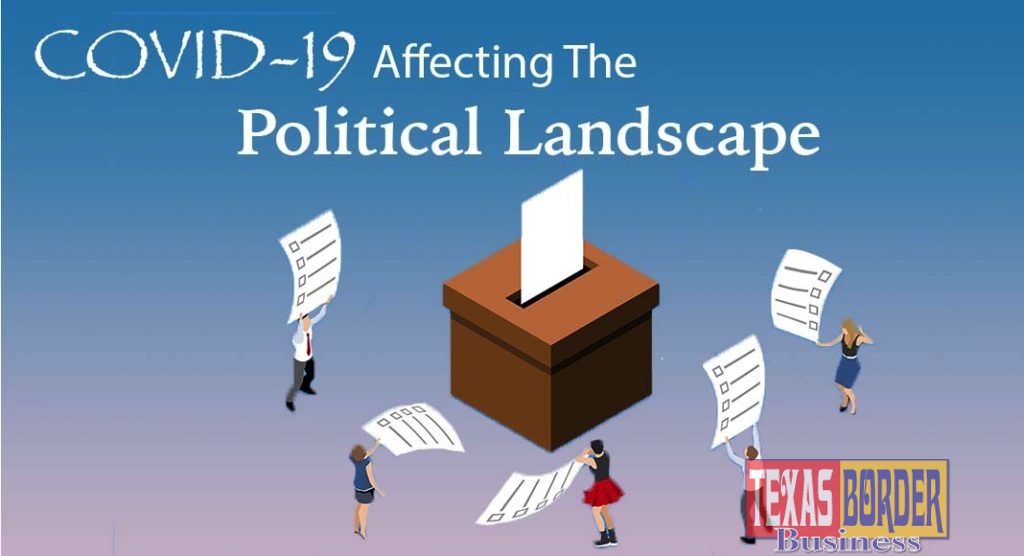
Texas Border Business
CORPUS CHRISTI, Texas – Three researchers at Texas A&M University-Corpus Christi have looked ahead to how the COVID-19 pandemic may affect upcoming elections – including the November 2020 presidential election – based on its impact on various demographic groups.
Dr. Wendi Pollock, Associate Professor of Criminal Justice, Dr. Beth Rauhaus, Assistant Professor of Public Administration, both in the College of Liberal Arts, and Dr. Andrew Johnson, Assistant Professor of Management in the College of Business, conducted the study in mid-March. With the pandemic impacts already being seen in certain places, the team moved very quickly to collect and assess the data.
Within just two weeks, the multidisciplinary team went from concept to publication in the journal Administrative Theory & Praxis, with full peer review, a process that normally takes many months or even a year to accomplish.
“The COVID-19 pandemic holds the potential to reshape the political, economic, and social systems in the U.S.,” Johnson said. “The political landscape stands to be significantly altered should a mass casualty event occur particularly for a sustained amount of time. This research considers the potential for a large shift in the electorate due to a potentially catastrophic mass casualty situation. More specifically, this paper examines political outcomes of COVID-19 from a demographic perspective.”
The team looked at models in March that projected COVID-19 cases could reach levels that would exceed hospital capacity across much of the country. Data also showed that COVID-19 tends to be more fatal in older individuals, those with compromised immune systems, and those who have other serious underlying medical conditions.
“As health resources are limited, decisions on how and which patients to treat poses a difficult choice for healthcare providers,” Pollock said. “Age and pre-existing health conditions are common considerations. Thus, individuals who are older in life are at a disadvantage in situations where choices must be made about which patients are allocated health resources.”
The study also found that recommendations regarding public health information from the Centers for Disease Control and Prevention and Dr. Anthony Fauci, a leading scientist and director of the National Institute of Allergy and Infectious Diseases, should be free of politics; however, political leaders have controlled much of the conversation.
“The political rhetoric has at times emphasized a need to ‘get back to work’ in hopes of minimizing the economic impact,” Rauhaus said. “This political desire runs against the advice provided by the aims of government actors concerned with the loss of life. Additionally, this approach to governing minimizes concern for well-being of citizens’ health and leads to a moral dilemma of how to govern during a crisis. Given that the virus tends to effect elderly more than the young, a policy that favors economic activity at the expense of action to reduce person-to-person contact will disproportionately harm the elderly.”
The paper also looked at voting patterns, especially in “swing” states.
“Certain demographics have a strong tendency to vote for one of the two major political parties more than others,” the researchers said. The team found that according to the Pew Research Center, when data from the 2016 U.S. Presidential election was analyzed, the Republican candidate (Donald Trump) had an advantage with voters 50 and older, while the Democratic candidate (Hillary Clinton) had an advantage with voters under 49.
“Older Americans tend to vote more than younger ones,” the team reported. “The loss of a significant number of older individuals from the older population could reshape U.S. politics. This could be particularly true in the U.S. presidential election as critical swing states were won by Trump with very narrow margins.”
While findings for younger age categories showed little potential impact from the pandemic, impacts were much more likely in the 65 and older age group.
Individuals in this age group are more likely to vote Republican, which explains why Republican voters in this category are projected to be lost in greater numbers than Democratic voters, the study found. For example, if Pennsylvania continued to use only social distancing to combat the latest coronavirus, they could potentially lose more than 13,000 more Republican than Democratic voters in the 65-plus age category. Even with a shelter-in-place order in effect, states such as Michigan and North Carolina could see significantly greater loses of Republican voters in this age group.
“These results suggest that when considering nothing other than the loss of life due to COVID-19, the demographic shifts alone could be enough to alter the political landscape of the U.S.,” researchers said.
Beyond the personal tragedy with every loss of life, these projections show the potential for profound effects on society, the team concluded. A dramatic change in the U.S. political landscape is just one of any number of effects upon society that may be caused by the COVID-19 pandemic and a mass casualty event.
“Numerous factors can impact an election, however, in American history we have rarely seen an event with the potential to reshape the political landscape of the nation in a matter of months,” the team said. “Ultimately, these political changes could have a significant impact on policies including those related to healthcare, immigration, the environment, education, gun control, and other issues.”













